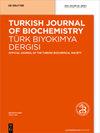呼吸性碱中毒可以用静脉血气值代替动脉血气值吗
IF 0.7
4区 生物学
Q4 BIOCHEMISTRY & MOLECULAR BIOLOGY
Turkish Journal of Biochemistry-turk Biyokimya Dergisi
Pub Date : 2014-01-01
DOI:10.5505/TJB.2014.87049
引用次数: 5
摘要
目的:肺泡通气量的增加导致大量二氧化碳从呼吸系统排出,导致低碳酸血症和呼吸性碱中毒。低碳酸血症减少脑血流量,碱中毒导致氧-血红蛋白解离曲线左移,导致组织供氧减少。因此,在紧急情况下,及时诊断和密切监测呼吸性碱中毒是必要的。本研究旨在比较呼吸性碱中毒患者的动、静脉血气参数,评价静脉血气替代动脉血气在呼吸性碱中毒患者中的可用性。方法:对90例呼吸性碱中毒患者进行前瞻性研究。参与研究的患者在进入急诊科后,在不进行任何治疗的情况下,在室内空气中同时抽取动脉和静脉血气样本。结果:动脉血、静脉血中pH、二氧化碳分压(pCO2)、碳酸氢盐(HCO 3)、碱过量(BE)的相关性(r = 0.764、r= 0.839、r= 0.843、r= 0.883)均有统计学意义(p 80 mmHg 23例(25.6%),60 ~ 80 mmHg 29例(32.2%),<60 mmHg 38例(42.2%))。三组间仅pao2 <60mmHg、o2饱和度<90%患者的动、静脉血气呈显著相关(r= 0.540, p<0.001)。结论:呼吸性碱中毒患者随访时,如果血氧饱和度≥90%;静脉血气样品的pH、pCO 2和HCO 3可以代替动脉血气样品。患者血氧饱和度<90%;静脉血气样品中的pH、pCO2、HCO3和pO2值可以代替动脉血气样品。本文章由计算机程序翻译,如有差异,请以英文原文为准。
Can venous blood gas values be used instead of arterial blood gas values in respiratory alkalosis
Objective: The increase in alveolar ventilation causes disposal of large amounts of carbon dioxide from the respiratory system resulting in hypocapnia and respiratory alkalosis. Hypocapnia reduces cerebral blood flow, alkalosis leads to a leftward shift in oxygen- hemoglobin dissociation curve causing reduced oxygen delivery to tissues. Therefore, immediate diagnosis and close monitoring of respiratory alkalosis is necessary in emergency situations. In this study, the comparison of arterial and venous blood gas parameters of patients with respiratory alkalosis, and the evaluation of the usability of venous blood gas instead of arterial blood gas in patients with respiratory alkalosis were aimed. Methods: Ninety patients with respiratory alkalosis were enrolled in this study prospectively. Arterial and venous blood gas samples of patients enrolled in the study were drawn simultaneously in room air without administering any treatment after admitting to the emergency department. Results: The correlation between the results of pH, partial pressure of carbon dioxide (pCO2), bicarbonate (HCO 3 ) and base excess (BE) (respectively, r= 0.764, r= 0.839, r= 0.843, r= 0.883) in arterial and venous blood gas samples were statistically significant (p 80 mmHg in 23 patients (25.6%), between 60-80 mmHg in 29 (32.2%) patients and <60 mmHg in 38 (42.2%) patients. A statistically significant correlation (r= 0.540, p<0.001) detected only between arterial and venous blood gas samples of patients with PaO 2 <60mmHg and O 2 saturation <90% among these three groups. Conclusion: In the follow-up of patients with respiratory alkalosis, if O2 saturation is ≥90%; pH, pCO 2 and HCO 3 of venous blood gas samples can be used instead of arterial blood gas samples. If patient's O2 saturation <90%; pH, pCO2, HCO3 and also pO2 values in venous blood gas sample can be used instead of arterial blood gas samples.
求助全文
通过发布文献求助,成功后即可免费获取论文全文。
去求助
来源期刊
CiteScore
1.20
自引率
0.00%
发文量
0
审稿时长
6-12 weeks
期刊介绍:
Turkish Journal of Biochemistry (TJB), official journal of Turkish Biochemical Society, is issued electronically every 2 months. The main aim of the journal is to support the research and publishing culture by ensuring that every published manuscript has an added value and thus providing international acceptance of the “readability” of the manuscripts published in the journal.

 求助内容:
求助内容: 应助结果提醒方式:
应助结果提醒方式:


